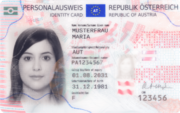
Summary
The Austrian identity card is issued to Austrian citizens. It can be used as a travel document when visiting countries in the EEA (EU plus EFTA) countries, Europe's microstates, Albania,[2] Bosnia and Herzegovina,[3] Georgia, Kosovo, Moldova, Montenegro,[4] North Macedonia,[5] North Cyprus,[6] Serbia, Montserrat, the French overseas territories, and on organized tours to Tunisia. Only around 10 % of the citizens of Austria had this card in 2012,[7] as they can use the Austrian driver's licenses or other identity cards domestically and the more widely accepted Austrian passport abroad.
| Austrian identity card | |
|---|---|
 | |
 Specimen of the credit-card sized Austrian identity card issued since 2 August 2021 | |
| Type | Voluntary identity document |
| Issued by | |
| Valid in |
|
| Expiration |
|
German names containing umlauts (ä, ö, ü) and/or ß are spelled in the correct way in the non-machine-readable zone of the passport, but with simple vowel + E and/or SS in the Machine Readable Zone, e.g. Müller becomes MUELLER, Groß becomes GROSS, and Gößmann becomes GOESSMANN.
The transcription mentioned above is generally used for airplane tickets etc., but sometimes (like in US visas) also simple vowels are used (MULLER, GOSSMANN). The three possible spelling variants of the same name (e.g. Müller / Mueller / Muller) in different documents sometimes lead to confusion, and the use of two different spellings within the same document (like in the passport) may give people who are unfamiliar with the German orthography the impression that the document is a forgery.
Austrian identity cards and passports may (but do not always) contain a trilingual (in German, English, and French) explanation of the German umlauts and ß, e.g. 'ß' entspricht / is equal to / correspond a 'SS'.
See also edit
References edit
- ^ "Visiting the UK as an EU, EEA or Swiss citizen". GOV.UK. Retrieved 2021-10-01.
- ^ Ministria për Europën dhe Punët e Jashtme. "Visa Regime for Foreign Citizens" (PDF). Ministria për Europën dhe Punët e Jashtme. Retrieved 23 December 2022.
- ^ Ministarstvo vajskih poslova Bosne i Hercegovine. "Visas". www.mvp.gov.ba. Ministarstvo vajskih poslova Bosne i Hercegovine. Retrieved 23 December 2022.
- ^ Government of Montenegro. "Information on the Visa Regime". Government of Montenegro. Retrieved 23 December 2022.
- ^ "Министерство за надворешни работи". Ministry of Foreign Affairs.
- ^ "» VISA RegulationsTurkish Republic of Northern Cyprus". 4 March 2014.
- ^ Ausstattungsgrad bei Reisepässen und Personalausweisen (in German)
External links edit
- Personalausweis on HELP.gv.at (in German)


